Contemporary People Management 2: HRM/CPM Role in Human Happiness
VerifiedAdded on 2021/05/31
|6
|2105
|266
Essay
AI Summary
This essay explores the relationship between Human Resource Management (HRM), Contemporary People Management (CPM), and human happiness through the lens of Utilitarianism. It discusses how HRM/CPM strategies can contribute to employee well-being and organizational success by addressing ethical issues and promoting a positive work environment. The essay analyzes Utilitarian theory, focusing on its core principle of maximizing happiness for the greatest number of people and its implications for HRM practices. It examines both the strengths and weaknesses of the theory, particularly its alignment with ethical principles and its potential impact on employee welfare. The essay also differentiates between hard and soft HRM approaches within the Utilitarian framework, highlighting the importance of ethical decision-making in achieving organizational goals while promoting employee happiness and job satisfaction. The document is available on Desklib, a platform offering a wide range of academic resources for students.

CONTEMPORARY PEOPLE MANAGEMENT
Human Happiness through HRM/CPM
Human Happiness through HRM/CPM
Paraphrase This Document
Need a fresh take? Get an instant paraphrase of this document with our AI Paraphraser
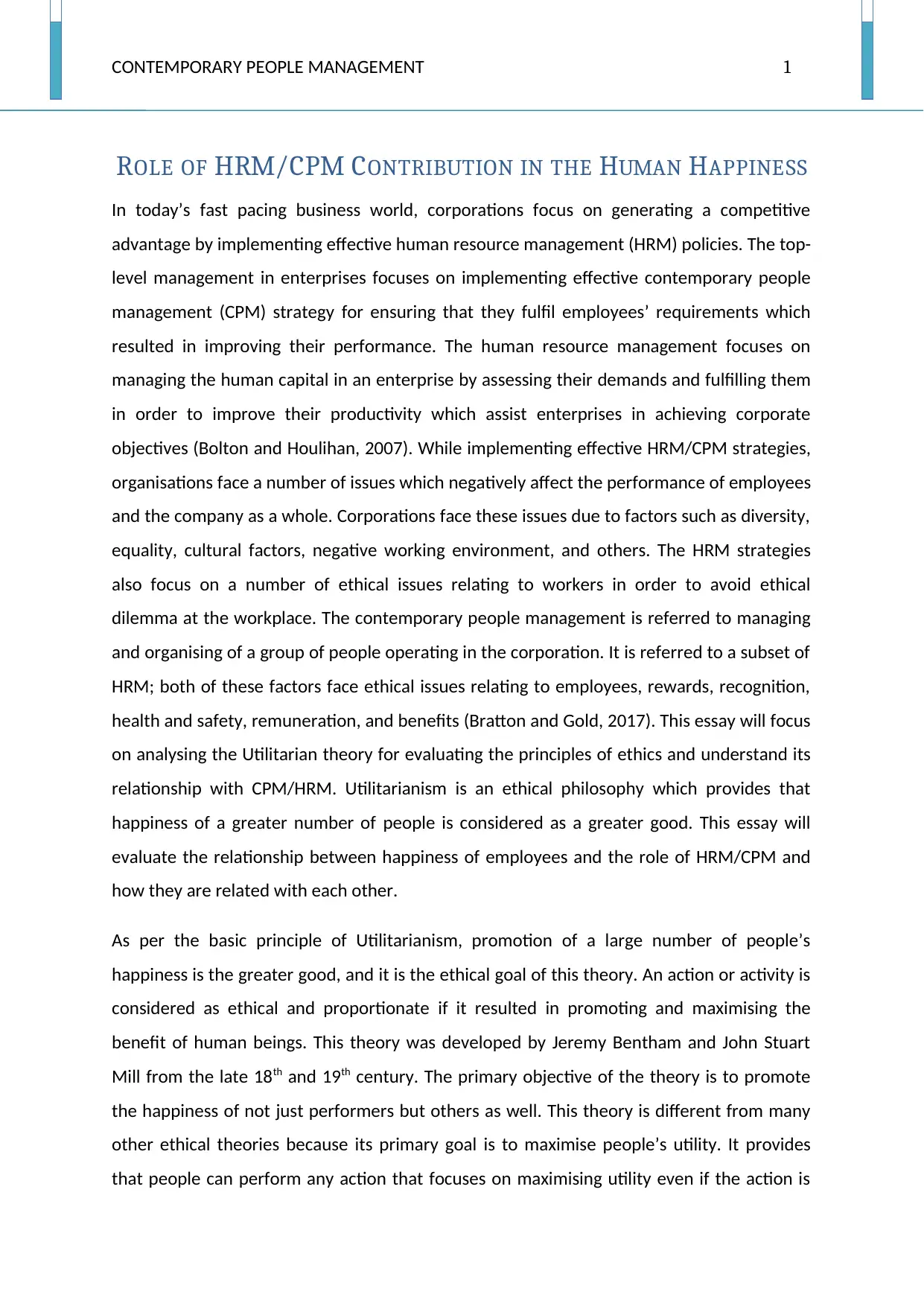
CONTEMPORARY PEOPLE MANAGEMENT 1
ROLE OF HRM/CPM CONTRIBUTION IN THE HUMAN HAPPINESS
In today’s fast pacing business world, corporations focus on generating a competitive
advantage by implementing effective human resource management (HRM) policies. The top-
level management in enterprises focuses on implementing effective contemporary people
management (CPM) strategy for ensuring that they fulfil employees’ requirements which
resulted in improving their performance. The human resource management focuses on
managing the human capital in an enterprise by assessing their demands and fulfilling them
in order to improve their productivity which assist enterprises in achieving corporate
objectives (Bolton and Houlihan, 2007). While implementing effective HRM/CPM strategies,
organisations face a number of issues which negatively affect the performance of employees
and the company as a whole. Corporations face these issues due to factors such as diversity,
equality, cultural factors, negative working environment, and others. The HRM strategies
also focus on a number of ethical issues relating to workers in order to avoid ethical
dilemma at the workplace. The contemporary people management is referred to managing
and organising of a group of people operating in the corporation. It is referred to a subset of
HRM; both of these factors face ethical issues relating to employees, rewards, recognition,
health and safety, remuneration, and benefits (Bratton and Gold, 2017). This essay will focus
on analysing the Utilitarian theory for evaluating the principles of ethics and understand its
relationship with CPM/HRM. Utilitarianism is an ethical philosophy which provides that
happiness of a greater number of people is considered as a greater good. This essay will
evaluate the relationship between happiness of employees and the role of HRM/CPM and
how they are related with each other.
As per the basic principle of Utilitarianism, promotion of a large number of people’s
happiness is the greater good, and it is the ethical goal of this theory. An action or activity is
considered as ethical and proportionate if it resulted in promoting and maximising the
benefit of human beings. This theory was developed by Jeremy Bentham and John Stuart
Mill from the late 18th and 19th century. The primary objective of the theory is to promote
the happiness of not just performers but others as well. This theory is different from many
other ethical theories because its primary goal is to maximise people’s utility. It provides
that people can perform any action that focuses on maximising utility even if the action is
ROLE OF HRM/CPM CONTRIBUTION IN THE HUMAN HAPPINESS
In today’s fast pacing business world, corporations focus on generating a competitive
advantage by implementing effective human resource management (HRM) policies. The top-
level management in enterprises focuses on implementing effective contemporary people
management (CPM) strategy for ensuring that they fulfil employees’ requirements which
resulted in improving their performance. The human resource management focuses on
managing the human capital in an enterprise by assessing their demands and fulfilling them
in order to improve their productivity which assist enterprises in achieving corporate
objectives (Bolton and Houlihan, 2007). While implementing effective HRM/CPM strategies,
organisations face a number of issues which negatively affect the performance of employees
and the company as a whole. Corporations face these issues due to factors such as diversity,
equality, cultural factors, negative working environment, and others. The HRM strategies
also focus on a number of ethical issues relating to workers in order to avoid ethical
dilemma at the workplace. The contemporary people management is referred to managing
and organising of a group of people operating in the corporation. It is referred to a subset of
HRM; both of these factors face ethical issues relating to employees, rewards, recognition,
health and safety, remuneration, and benefits (Bratton and Gold, 2017). This essay will focus
on analysing the Utilitarian theory for evaluating the principles of ethics and understand its
relationship with CPM/HRM. Utilitarianism is an ethical philosophy which provides that
happiness of a greater number of people is considered as a greater good. This essay will
evaluate the relationship between happiness of employees and the role of HRM/CPM and
how they are related with each other.
As per the basic principle of Utilitarianism, promotion of a large number of people’s
happiness is the greater good, and it is the ethical goal of this theory. An action or activity is
considered as ethical and proportionate if it resulted in promoting and maximising the
benefit of human beings. This theory was developed by Jeremy Bentham and John Stuart
Mill from the late 18th and 19th century. The primary objective of the theory is to promote
the happiness of not just performers but others as well. This theory is different from many
other ethical theories because its primary goal is to maximise people’s utility. It provides
that people can perform any action that focuses on maximising utility even if the action is
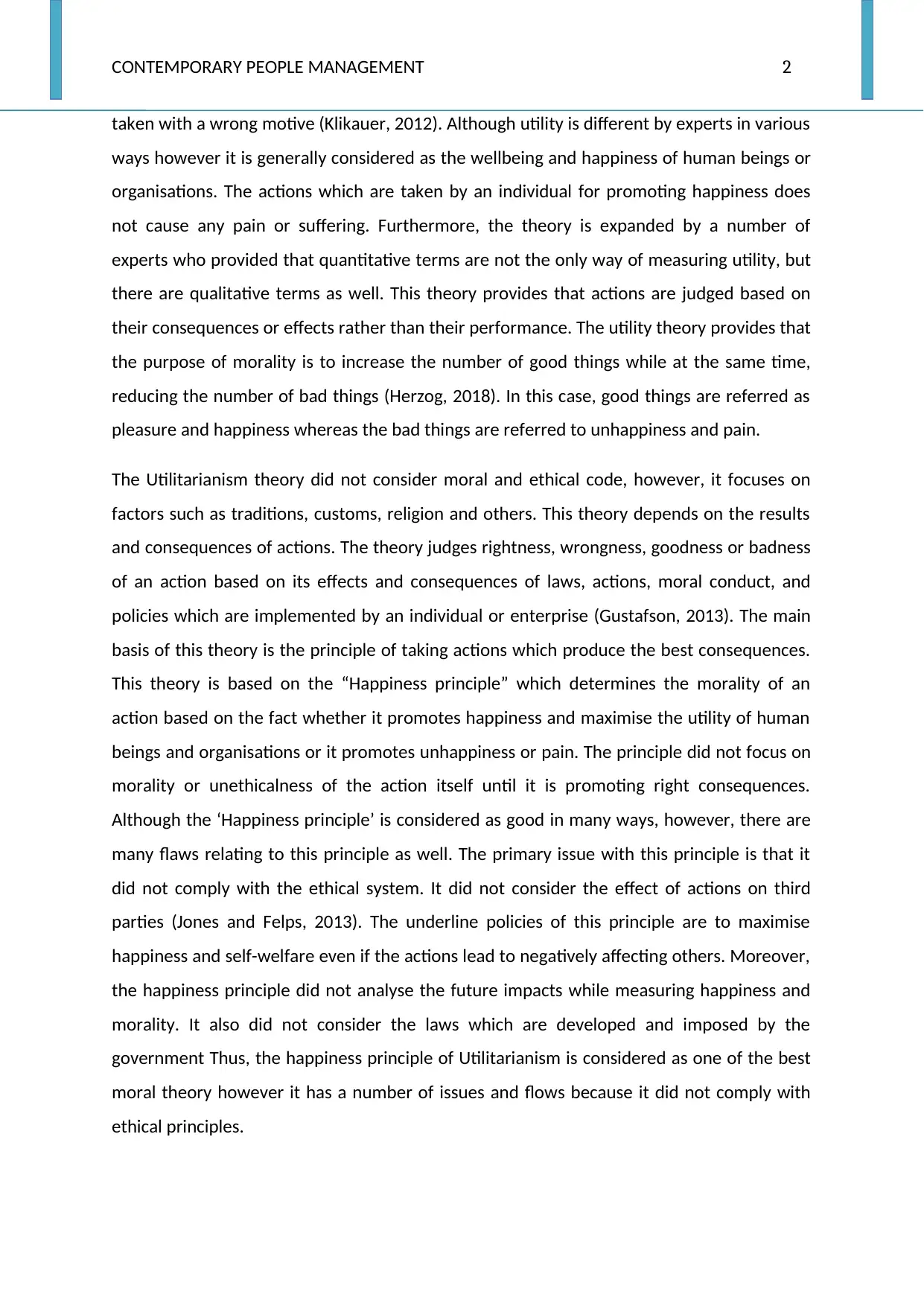
CONTEMPORARY PEOPLE MANAGEMENT 2
taken with a wrong motive (Klikauer, 2012). Although utility is different by experts in various
ways however it is generally considered as the wellbeing and happiness of human beings or
organisations. The actions which are taken by an individual for promoting happiness does
not cause any pain or suffering. Furthermore, the theory is expanded by a number of
experts who provided that quantitative terms are not the only way of measuring utility, but
there are qualitative terms as well. This theory provides that actions are judged based on
their consequences or effects rather than their performance. The utility theory provides that
the purpose of morality is to increase the number of good things while at the same time,
reducing the number of bad things (Herzog, 2018). In this case, good things are referred as
pleasure and happiness whereas the bad things are referred to unhappiness and pain.
The Utilitarianism theory did not consider moral and ethical code, however, it focuses on
factors such as traditions, customs, religion and others. This theory depends on the results
and consequences of actions. The theory judges rightness, wrongness, goodness or badness
of an action based on its effects and consequences of laws, actions, moral conduct, and
policies which are implemented by an individual or enterprise (Gustafson, 2013). The main
basis of this theory is the principle of taking actions which produce the best consequences.
This theory is based on the “Happiness principle” which determines the morality of an
action based on the fact whether it promotes happiness and maximise the utility of human
beings and organisations or it promotes unhappiness or pain. The principle did not focus on
morality or unethicalness of the action itself until it is promoting right consequences.
Although the ‘Happiness principle’ is considered as good in many ways, however, there are
many flaws relating to this principle as well. The primary issue with this principle is that it
did not comply with the ethical system. It did not consider the effect of actions on third
parties (Jones and Felps, 2013). The underline policies of this principle are to maximise
happiness and self-welfare even if the actions lead to negatively affecting others. Moreover,
the happiness principle did not analyse the future impacts while measuring happiness and
morality. It also did not consider the laws which are developed and imposed by the
government Thus, the happiness principle of Utilitarianism is considered as one of the best
moral theory however it has a number of issues and flows because it did not comply with
ethical principles.
taken with a wrong motive (Klikauer, 2012). Although utility is different by experts in various
ways however it is generally considered as the wellbeing and happiness of human beings or
organisations. The actions which are taken by an individual for promoting happiness does
not cause any pain or suffering. Furthermore, the theory is expanded by a number of
experts who provided that quantitative terms are not the only way of measuring utility, but
there are qualitative terms as well. This theory provides that actions are judged based on
their consequences or effects rather than their performance. The utility theory provides that
the purpose of morality is to increase the number of good things while at the same time,
reducing the number of bad things (Herzog, 2018). In this case, good things are referred as
pleasure and happiness whereas the bad things are referred to unhappiness and pain.
The Utilitarianism theory did not consider moral and ethical code, however, it focuses on
factors such as traditions, customs, religion and others. This theory depends on the results
and consequences of actions. The theory judges rightness, wrongness, goodness or badness
of an action based on its effects and consequences of laws, actions, moral conduct, and
policies which are implemented by an individual or enterprise (Gustafson, 2013). The main
basis of this theory is the principle of taking actions which produce the best consequences.
This theory is based on the “Happiness principle” which determines the morality of an
action based on the fact whether it promotes happiness and maximise the utility of human
beings and organisations or it promotes unhappiness or pain. The principle did not focus on
morality or unethicalness of the action itself until it is promoting right consequences.
Although the ‘Happiness principle’ is considered as good in many ways, however, there are
many flaws relating to this principle as well. The primary issue with this principle is that it
did not comply with the ethical system. It did not consider the effect of actions on third
parties (Jones and Felps, 2013). The underline policies of this principle are to maximise
happiness and self-welfare even if the actions lead to negatively affecting others. Moreover,
the happiness principle did not analyse the future impacts while measuring happiness and
morality. It also did not consider the laws which are developed and imposed by the
government Thus, the happiness principle of Utilitarianism is considered as one of the best
moral theory however it has a number of issues and flows because it did not comply with
ethical principles.
⊘ This is a preview!⊘
Do you want full access?
Subscribe today to unlock all pages.

Trusted by 1+ million students worldwide
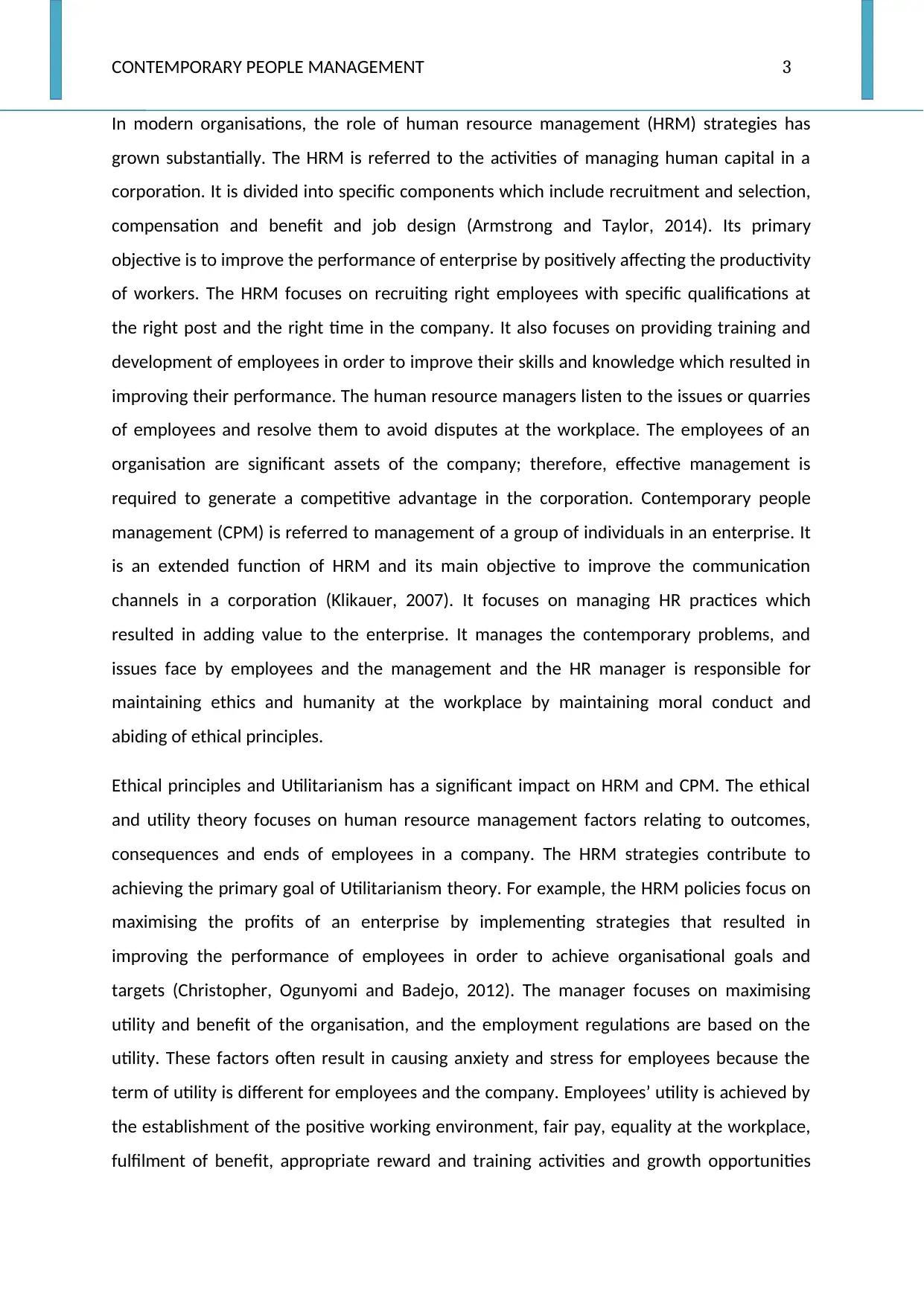
CONTEMPORARY PEOPLE MANAGEMENT 3
In modern organisations, the role of human resource management (HRM) strategies has
grown substantially. The HRM is referred to the activities of managing human capital in a
corporation. It is divided into specific components which include recruitment and selection,
compensation and benefit and job design (Armstrong and Taylor, 2014). Its primary
objective is to improve the performance of enterprise by positively affecting the productivity
of workers. The HRM focuses on recruiting right employees with specific qualifications at
the right post and the right time in the company. It also focuses on providing training and
development of employees in order to improve their skills and knowledge which resulted in
improving their performance. The human resource managers listen to the issues or quarries
of employees and resolve them to avoid disputes at the workplace. The employees of an
organisation are significant assets of the company; therefore, effective management is
required to generate a competitive advantage in the corporation. Contemporary people
management (CPM) is referred to management of a group of individuals in an enterprise. It
is an extended function of HRM and its main objective to improve the communication
channels in a corporation (Klikauer, 2007). It focuses on managing HR practices which
resulted in adding value to the enterprise. It manages the contemporary problems, and
issues face by employees and the management and the HR manager is responsible for
maintaining ethics and humanity at the workplace by maintaining moral conduct and
abiding of ethical principles.
Ethical principles and Utilitarianism has a significant impact on HRM and CPM. The ethical
and utility theory focuses on human resource management factors relating to outcomes,
consequences and ends of employees in a company. The HRM strategies contribute to
achieving the primary goal of Utilitarianism theory. For example, the HRM policies focus on
maximising the profits of an enterprise by implementing strategies that resulted in
improving the performance of employees in order to achieve organisational goals and
targets (Christopher, Ogunyomi and Badejo, 2012). The manager focuses on maximising
utility and benefit of the organisation, and the employment regulations are based on the
utility. These factors often result in causing anxiety and stress for employees because the
term of utility is different for employees and the company. Employees’ utility is achieved by
the establishment of the positive working environment, fair pay, equality at the workplace,
fulfilment of benefit, appropriate reward and training activities and growth opportunities
In modern organisations, the role of human resource management (HRM) strategies has
grown substantially. The HRM is referred to the activities of managing human capital in a
corporation. It is divided into specific components which include recruitment and selection,
compensation and benefit and job design (Armstrong and Taylor, 2014). Its primary
objective is to improve the performance of enterprise by positively affecting the productivity
of workers. The HRM focuses on recruiting right employees with specific qualifications at
the right post and the right time in the company. It also focuses on providing training and
development of employees in order to improve their skills and knowledge which resulted in
improving their performance. The human resource managers listen to the issues or quarries
of employees and resolve them to avoid disputes at the workplace. The employees of an
organisation are significant assets of the company; therefore, effective management is
required to generate a competitive advantage in the corporation. Contemporary people
management (CPM) is referred to management of a group of individuals in an enterprise. It
is an extended function of HRM and its main objective to improve the communication
channels in a corporation (Klikauer, 2007). It focuses on managing HR practices which
resulted in adding value to the enterprise. It manages the contemporary problems, and
issues face by employees and the management and the HR manager is responsible for
maintaining ethics and humanity at the workplace by maintaining moral conduct and
abiding of ethical principles.
Ethical principles and Utilitarianism has a significant impact on HRM and CPM. The ethical
and utility theory focuses on human resource management factors relating to outcomes,
consequences and ends of employees in a company. The HRM strategies contribute to
achieving the primary goal of Utilitarianism theory. For example, the HRM policies focus on
maximising the profits of an enterprise by implementing strategies that resulted in
improving the performance of employees in order to achieve organisational goals and
targets (Christopher, Ogunyomi and Badejo, 2012). The manager focuses on maximising
utility and benefit of the organisation, and the employment regulations are based on the
utility. These factors often result in causing anxiety and stress for employees because the
term of utility is different for employees and the company. Employees’ utility is achieved by
the establishment of the positive working environment, fair pay, equality at the workplace,
fulfilment of benefit, appropriate reward and training activities and growth opportunities
Paraphrase This Document
Need a fresh take? Get an instant paraphrase of this document with our AI Paraphraser
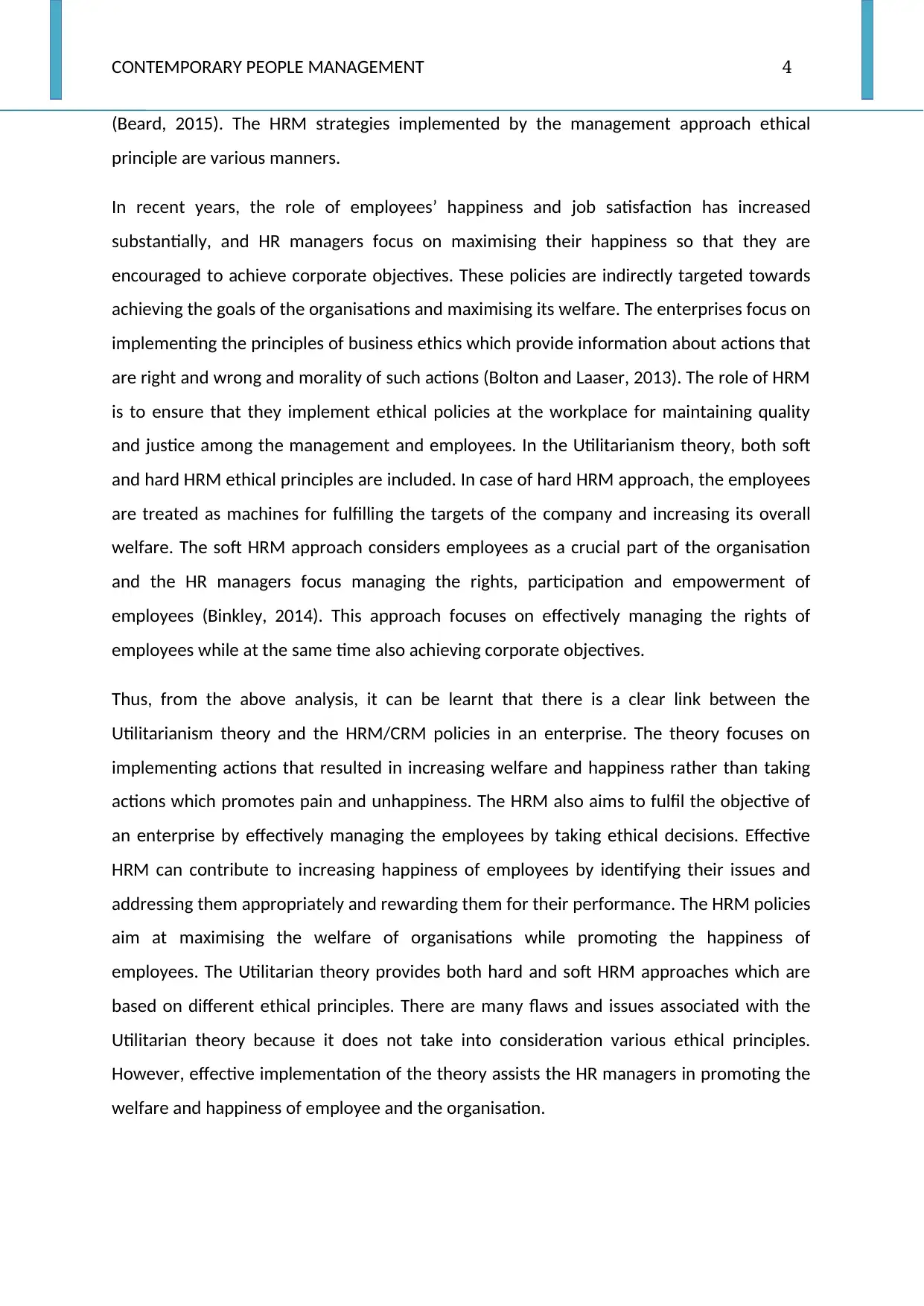
CONTEMPORARY PEOPLE MANAGEMENT 4
(Beard, 2015). The HRM strategies implemented by the management approach ethical
principle are various manners.
In recent years, the role of employees’ happiness and job satisfaction has increased
substantially, and HR managers focus on maximising their happiness so that they are
encouraged to achieve corporate objectives. These policies are indirectly targeted towards
achieving the goals of the organisations and maximising its welfare. The enterprises focus on
implementing the principles of business ethics which provide information about actions that
are right and wrong and morality of such actions (Bolton and Laaser, 2013). The role of HRM
is to ensure that they implement ethical policies at the workplace for maintaining quality
and justice among the management and employees. In the Utilitarianism theory, both soft
and hard HRM ethical principles are included. In case of hard HRM approach, the employees
are treated as machines for fulfilling the targets of the company and increasing its overall
welfare. The soft HRM approach considers employees as a crucial part of the organisation
and the HR managers focus managing the rights, participation and empowerment of
employees (Binkley, 2014). This approach focuses on effectively managing the rights of
employees while at the same time also achieving corporate objectives.
Thus, from the above analysis, it can be learnt that there is a clear link between the
Utilitarianism theory and the HRM/CRM policies in an enterprise. The theory focuses on
implementing actions that resulted in increasing welfare and happiness rather than taking
actions which promotes pain and unhappiness. The HRM also aims to fulfil the objective of
an enterprise by effectively managing the employees by taking ethical decisions. Effective
HRM can contribute to increasing happiness of employees by identifying their issues and
addressing them appropriately and rewarding them for their performance. The HRM policies
aim at maximising the welfare of organisations while promoting the happiness of
employees. The Utilitarian theory provides both hard and soft HRM approaches which are
based on different ethical principles. There are many flaws and issues associated with the
Utilitarian theory because it does not take into consideration various ethical principles.
However, effective implementation of the theory assists the HR managers in promoting the
welfare and happiness of employee and the organisation.
(Beard, 2015). The HRM strategies implemented by the management approach ethical
principle are various manners.
In recent years, the role of employees’ happiness and job satisfaction has increased
substantially, and HR managers focus on maximising their happiness so that they are
encouraged to achieve corporate objectives. These policies are indirectly targeted towards
achieving the goals of the organisations and maximising its welfare. The enterprises focus on
implementing the principles of business ethics which provide information about actions that
are right and wrong and morality of such actions (Bolton and Laaser, 2013). The role of HRM
is to ensure that they implement ethical policies at the workplace for maintaining quality
and justice among the management and employees. In the Utilitarianism theory, both soft
and hard HRM ethical principles are included. In case of hard HRM approach, the employees
are treated as machines for fulfilling the targets of the company and increasing its overall
welfare. The soft HRM approach considers employees as a crucial part of the organisation
and the HR managers focus managing the rights, participation and empowerment of
employees (Binkley, 2014). This approach focuses on effectively managing the rights of
employees while at the same time also achieving corporate objectives.
Thus, from the above analysis, it can be learnt that there is a clear link between the
Utilitarianism theory and the HRM/CRM policies in an enterprise. The theory focuses on
implementing actions that resulted in increasing welfare and happiness rather than taking
actions which promotes pain and unhappiness. The HRM also aims to fulfil the objective of
an enterprise by effectively managing the employees by taking ethical decisions. Effective
HRM can contribute to increasing happiness of employees by identifying their issues and
addressing them appropriately and rewarding them for their performance. The HRM policies
aim at maximising the welfare of organisations while promoting the happiness of
employees. The Utilitarian theory provides both hard and soft HRM approaches which are
based on different ethical principles. There are many flaws and issues associated with the
Utilitarian theory because it does not take into consideration various ethical principles.
However, effective implementation of the theory assists the HR managers in promoting the
welfare and happiness of employee and the organisation.
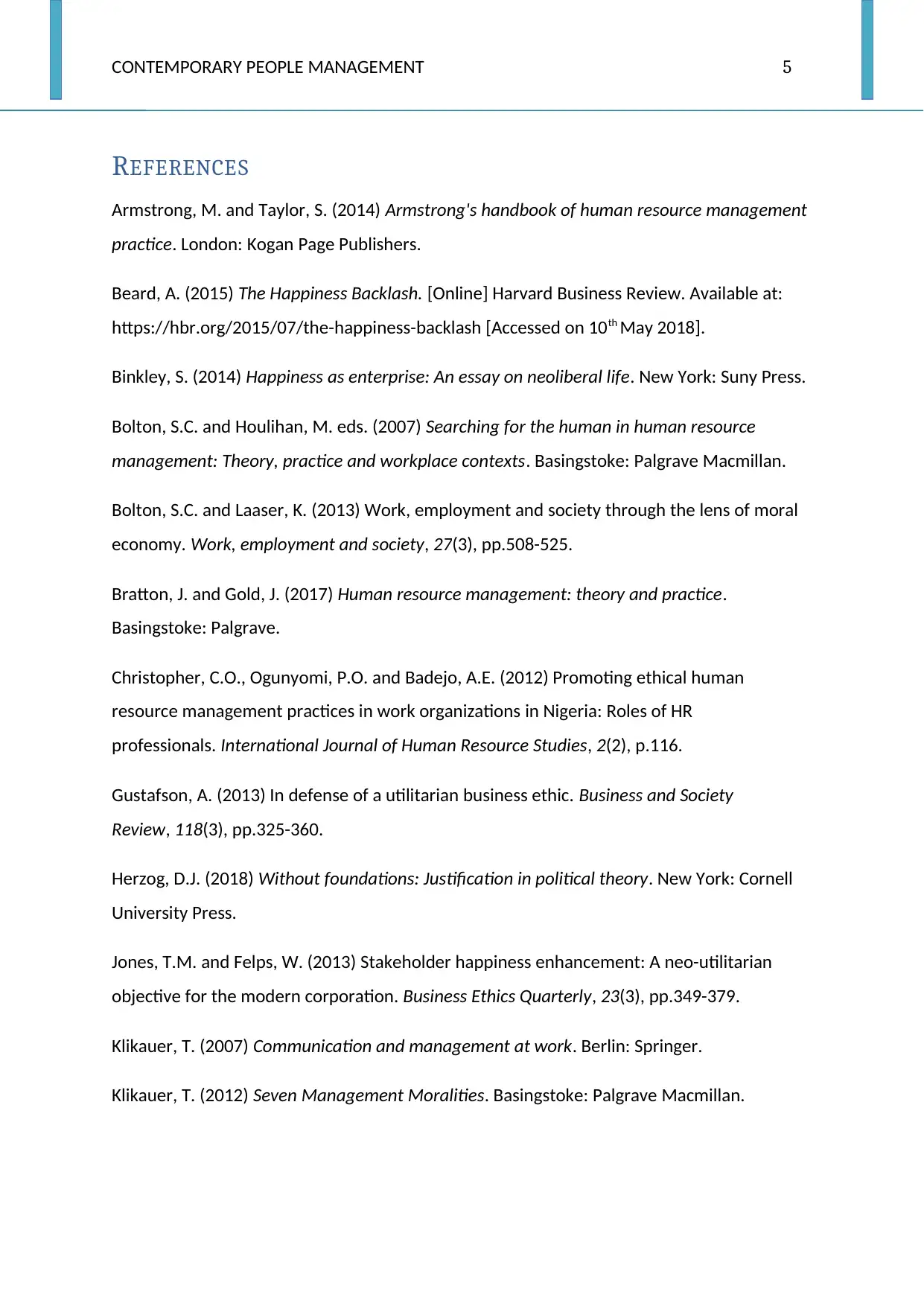
CONTEMPORARY PEOPLE MANAGEMENT 5
REFERENCES
Armstrong, M. and Taylor, S. (2014) Armstrong's handbook of human resource management
practice. London: Kogan Page Publishers.
Beard, A. (2015) The Happiness Backlash. [Online] Harvard Business Review. Available at:
https://hbr.org/2015/07/the-happiness-backlash [Accessed on 10th May 2018].
Binkley, S. (2014) Happiness as enterprise: An essay on neoliberal life. New York: Suny Press.
Bolton, S.C. and Houlihan, M. eds. (2007) Searching for the human in human resource
management: Theory, practice and workplace contexts. Basingstoke: Palgrave Macmillan.
Bolton, S.C. and Laaser, K. (2013) Work, employment and society through the lens of moral
economy. Work, employment and society, 27(3), pp.508-525.
Bratton, J. and Gold, J. (2017) Human resource management: theory and practice.
Basingstoke: Palgrave.
Christopher, C.O., Ogunyomi, P.O. and Badejo, A.E. (2012) Promoting ethical human
resource management practices in work organizations in Nigeria: Roles of HR
professionals. International Journal of Human Resource Studies, 2(2), p.116.
Gustafson, A. (2013) In defense of a utilitarian business ethic. Business and Society
Review, 118(3), pp.325-360.
Herzog, D.J. (2018) Without foundations: Justification in political theory. New York: Cornell
University Press.
Jones, T.M. and Felps, W. (2013) Stakeholder happiness enhancement: A neo-utilitarian
objective for the modern corporation. Business Ethics Quarterly, 23(3), pp.349-379.
Klikauer, T. (2007) Communication and management at work. Berlin: Springer.
Klikauer, T. (2012) Seven Management Moralities. Basingstoke: Palgrave Macmillan.
REFERENCES
Armstrong, M. and Taylor, S. (2014) Armstrong's handbook of human resource management
practice. London: Kogan Page Publishers.
Beard, A. (2015) The Happiness Backlash. [Online] Harvard Business Review. Available at:
https://hbr.org/2015/07/the-happiness-backlash [Accessed on 10th May 2018].
Binkley, S. (2014) Happiness as enterprise: An essay on neoliberal life. New York: Suny Press.
Bolton, S.C. and Houlihan, M. eds. (2007) Searching for the human in human resource
management: Theory, practice and workplace contexts. Basingstoke: Palgrave Macmillan.
Bolton, S.C. and Laaser, K. (2013) Work, employment and society through the lens of moral
economy. Work, employment and society, 27(3), pp.508-525.
Bratton, J. and Gold, J. (2017) Human resource management: theory and practice.
Basingstoke: Palgrave.
Christopher, C.O., Ogunyomi, P.O. and Badejo, A.E. (2012) Promoting ethical human
resource management practices in work organizations in Nigeria: Roles of HR
professionals. International Journal of Human Resource Studies, 2(2), p.116.
Gustafson, A. (2013) In defense of a utilitarian business ethic. Business and Society
Review, 118(3), pp.325-360.
Herzog, D.J. (2018) Without foundations: Justification in political theory. New York: Cornell
University Press.
Jones, T.M. and Felps, W. (2013) Stakeholder happiness enhancement: A neo-utilitarian
objective for the modern corporation. Business Ethics Quarterly, 23(3), pp.349-379.
Klikauer, T. (2007) Communication and management at work. Berlin: Springer.
Klikauer, T. (2012) Seven Management Moralities. Basingstoke: Palgrave Macmillan.
⊘ This is a preview!⊘
Do you want full access?
Subscribe today to unlock all pages.

Trusted by 1+ million students worldwide
1 out of 6
Related Documents
Your All-in-One AI-Powered Toolkit for Academic Success.
+13062052269
info@desklib.com
Available 24*7 on WhatsApp / Email
![[object Object]](/_next/static/media/star-bottom.7253800d.svg)
Unlock your academic potential
Copyright © 2020–2025 A2Z Services. All Rights Reserved. Developed and managed by ZUCOL.





